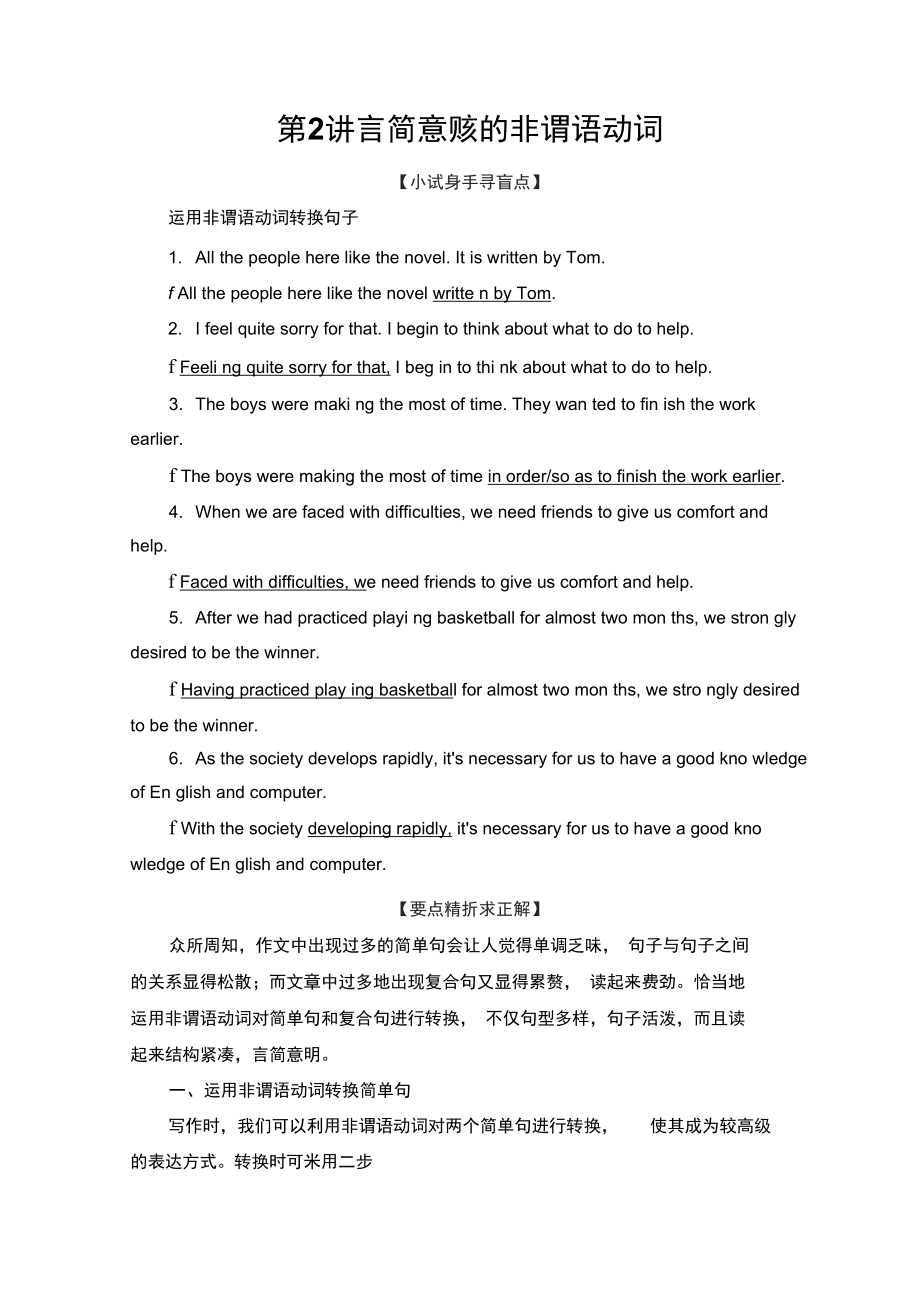《2020版第3部分層級(jí)2第2講言簡(jiǎn)意賅的非謂語(yǔ)動(dòng)詞》由會(huì)員分享,可在線(xiàn)閱讀���,更多相關(guān)《2020版第3部分層級(jí)2第2講言簡(jiǎn)意賅的非謂語(yǔ)動(dòng)詞(4頁(yè)珍藏版)》請(qǐng)?jiān)谘b配圖網(wǎng)上搜索�。
1�、第2講言簡(jiǎn)意賅的非謂語(yǔ)動(dòng)詞
【小試身手尋盲點(diǎn)】
運(yùn)用非謂語(yǔ)動(dòng)詞轉(zhuǎn)換句子
1. All the people here like the novel. It is written by Tom.
f All the people here like the novel writte n by Tom.
2. I feel quite sorry for that. I begin to think about what to do to help.
f Feeli ng quite sorry for that, I beg in to thi nk about what to do
2、 to help.
3. The boys were maki ng the most of time. They wan ted to fin ish the work earlier.
f The boys were making the most of time in order/so as to finish the work earlier.
4. When we are faced with difficulties, we need friends to give us comfort and help.
f Faced with difficulties, we nee
3��、d friends to give us comfort and help.
5. After we had practiced playi ng basketball for almost two mon ths, we stron gly desired to be the winner.
f Having practiced play ing basketball for almost two mon ths, we stro ngly desired to be the winner.
6. As the society develops rapidly, it's necess
4�、ary for us to have a good kno wledge of En glish and computer.
f With the society developing rapidly, it's necessary for us to have a good kno wledge of En glish and computer.
【要點(diǎn)精折求正解】
眾所周知,作文中出現(xiàn)過(guò)多的簡(jiǎn)單句會(huì)讓人覺(jué)得單調(diào)乏味���, 句子與句子之間 的關(guān)系顯得松散��;而文章中過(guò)多地出現(xiàn)復(fù)合句又顯得累贅�, 讀起來(lái)費(fèi)勁���。恰當(dāng)?shù)?運(yùn)用非謂語(yǔ)動(dòng)詞對(duì)簡(jiǎn)單句和復(fù)合句進(jìn)行轉(zhuǎn)換��, 不僅句型多樣����,句子活潑���,而且讀 起來(lái)
5�����、結(jié)構(gòu)緊湊�,言簡(jiǎn)意明�����。
一��、運(yùn)用非謂語(yǔ)動(dòng)詞轉(zhuǎn)換簡(jiǎn)單句
寫(xiě)作時(shí)�����,我們可以利用非謂語(yǔ)動(dòng)詞對(duì)兩個(gè)簡(jiǎn)單句進(jìn)行轉(zhuǎn)換����, 使其成為較高級(jí) 的表達(dá)方式。轉(zhuǎn)換時(shí)可米用二步
第一步:寫(xiě)出兩個(gè)簡(jiǎn)單句����。
① Con seque ntly, some viewers bega n to turn away from cin emas.
② It led to a slower growth.
第二步:讓句①作主句,用非謂語(yǔ)動(dòng)詞改寫(xiě)句②���。
第三步:讓句②作結(jié)果狀語(yǔ)��,由于其動(dòng)詞lead to與主語(yǔ)it之間為主謂關(guān)系����, 故用現(xiàn)在分詞短語(yǔ)作結(jié)果狀語(yǔ)。
(2017 江蘇卷書(shū)面表達(dá) )Consequently, so
6�、me viewers began to turn away from cinemas, leading to a slower growth.
例 1 I hear that you are recruiting some volunteers to welcome the coming foreign students.I am gladly writing to apply for this job.
f (2018 浙江卷)Hearing that you are recruiting some volunteers to welcome the coming foreign stu
7、dents�, I am gladly writing to apply for this job.
例 2 I am writing to invite you to attend the Chinese paper-cutting art exhibition.It will be held in the art gallery from 8: 00 am to 5: 00 pm next Sunday in our city center.
f (2017 全國(guó)卷 n )1 am writing to invite you to attend the Chinese papercutt
8、ing art exhibition to be held in the art gallery from 8: 00 am to 5: 00 pm next Sunday in our city center.
二���、運(yùn)用非謂語(yǔ)動(dòng)詞轉(zhuǎn)換復(fù)合句 用非謂語(yǔ)動(dòng)詞轉(zhuǎn)換復(fù)合句比轉(zhuǎn)換簡(jiǎn)單句要容易一些��, 因?yàn)樾柁D(zhuǎn)換的一般是從 句部分���,這時(shí)只需要判斷用何種非謂語(yǔ)動(dòng)詞, 再把握好時(shí)態(tài)和語(yǔ)態(tài)即可��, 所以只 需兩步�。
第一步:寫(xiě)出一個(gè)復(fù)合句。
Since you have realized that your time is limited, you ' ll have to study for your g
9�����、oals without anger or hesitation.
第二步:把si nee引導(dǎo)的原因狀語(yǔ)從句轉(zhuǎn)換為非謂語(yǔ)動(dòng)詞,realize與you之 間為主謂關(guān)系�����,且表示完成��,故用現(xiàn)在分詞的完成時(shí)作狀語(yǔ)��。
Having realized that your time is limited, you' ll have to study for your goals without anger or hesitation.
例1 If it is carried out continuously, it will benefit all of us greatly and we are
10�����、sure to make obvious progress.
f Carried out continu ously, it will ben efit all of us greatly and we are sure to make obvious progress.
例 2 Because I thought that his solution might be wrong, I carefully analyzed the problem and tried to work it out in a differe nt way.
f Thinking that his solut
11��、io n might be wrong, I carefully an alyzed the problem and tried to work it out in a differe nt way.
三��、寫(xiě)作中非謂語(yǔ)動(dòng)詞的常用句型
1. remain to be done有待于被
Many questi ons have to be settled and much rema ins to be done in our educatio nal work我們的教育工作中還有許多問(wèn)題要解決���,還有許多事情要去做。
2. 連詞 when/while/ onc&unless/ althou
12����、gh ...+ doing/done
Whe n search ing for some in formati on, we can operate by touchi ng the scree n.
當(dāng)查找一些信息時(shí),我們可以通過(guò)觸摸屏來(lái)操作���。
3. compared with/to ..與 比較
Compared with the escaped driver, I am proud of what I did.
與逃逸的司機(jī)相比���,我為所做之事感到非常自豪��。
4. be saidreported/ considered ...to do ..據(jù)說(shuō)/報(bào)道/認(rèn)為
A bus f
13�、ull of passe ngers was reported to have gone out of con trol on a highway south of the city.
據(jù)報(bào)道一輛滿(mǎn)載乘客的公共汽車(chē)在城南的一條公路上失去了控制��。
5. with +賓語(yǔ)+補(bǔ)足語(yǔ)
In the picture, a boy in worn clothes sits beside a woode n table with a pile of bamboo books on it.
在畫(huà)中��,一個(gè)穿著破舊衣服的男孩坐在木桌旁邊�����,桌上有一堆竹簡(jiǎn)��。
【語(yǔ)篇演練提考能】
利用非謂語(yǔ)動(dòng)詞����,結(jié)合中文提
14、示補(bǔ)全短文
Dear Shirley�����,
Glad to receive your e-mail. 1.The problem men tio ned in your e-mail(你郵件中 提到的問(wèn)題)is com mon among middle school stude nts. Don' t worry about it too much. Follow the follow ing advice I give you, and you may 2.get/have your problem settled使你的問(wèn)題得到解決).
First of all, believe in y
15���、ourself. The first thi ng you must do is 3.to smile at your classmates對(duì)你的同學(xué)微笑).A smile speaks louder about 4.your wish to make friends(你交朋友的愿望 )than any words. Your smile will show that you are friendly to them. Next 5.try talking with a student(試著和學(xué)生交談 )who is as shy as you or who shares the same in terest as you. You can discuss your studies with a classmate, or you can also talk about your hobbies.
If anyone is in trouble in life or study, you should be ready to help him or her.
6. Having rega ined your con fide nee在恢復(fù)你的自信后),you can make as many friends as possible.
Yours�����,
Li Hua
 2020版第3部分層級(jí)2第2講言簡(jiǎn)意賅的非謂語(yǔ)動(dòng)詞
2020版第3部分層級(jí)2第2講言簡(jiǎn)意賅的非謂語(yǔ)動(dòng)詞

